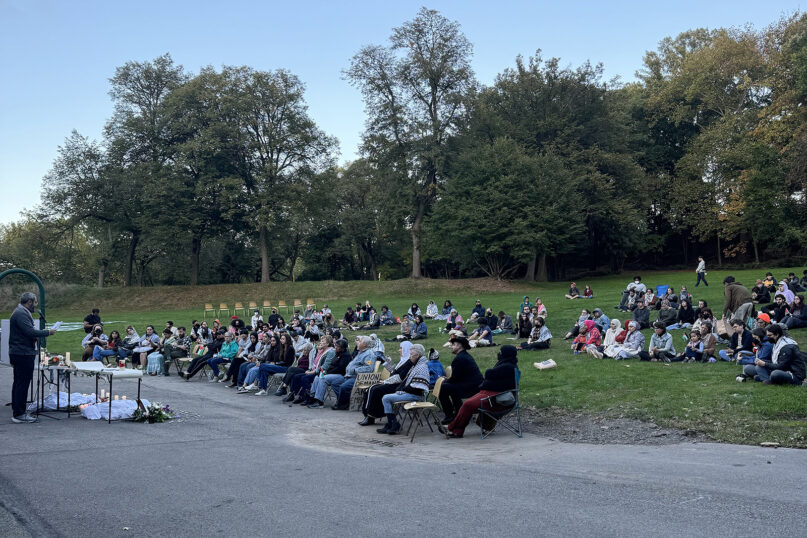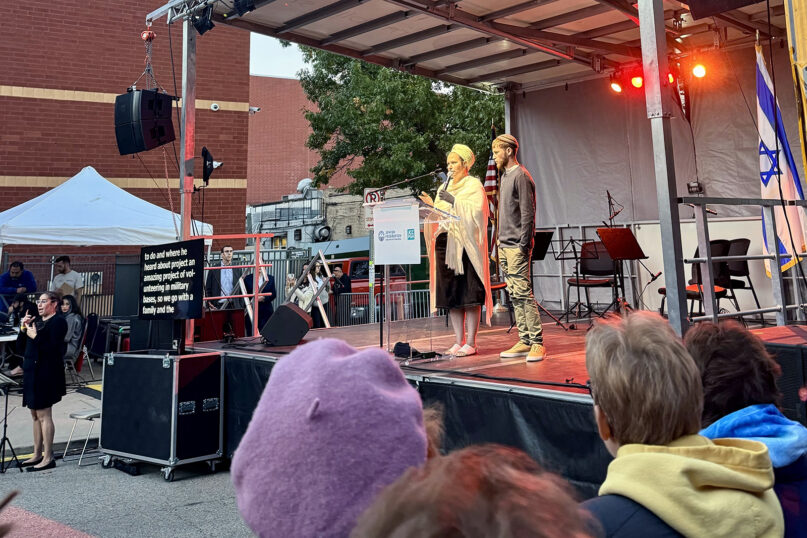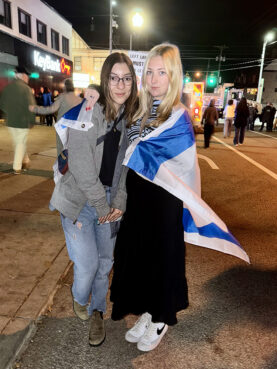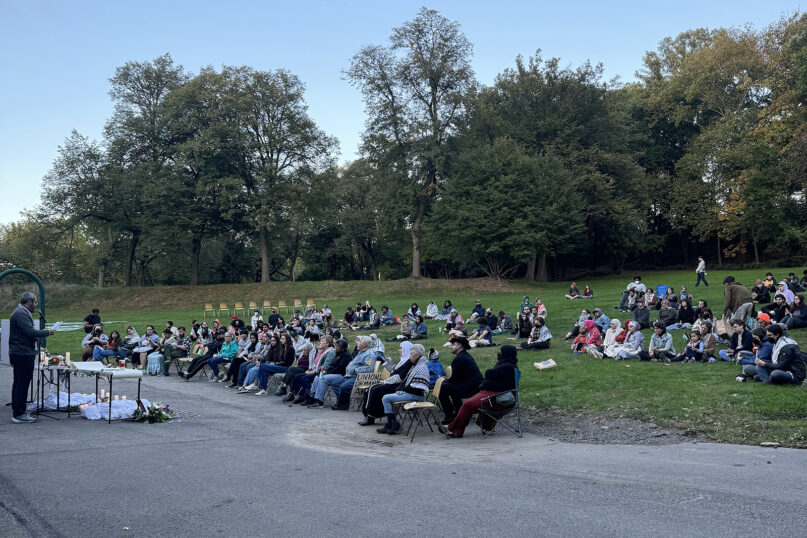
PITTSBURGH (RNS) — On a blocked-off street behind the Jewish Community Center in the bustling heart of Pittsburgh’s Squirrel Hill neighborhood, roughly 1,000 people stood shoulder to shoulder Monday (Oct. 7) to commemorate the Hamas massacre in southern Israel a year ago. Some waved Israeli flags or held images of hostages. A wide diversity of Jews prayed, sang and remembered the 1,200 Israelis killed and 250 abducted into Gaza.
“This display of unity tonight represents community members with different Jewish observance from different geographies within the Pittsburgh region, different ages. This is what our Jewish community is all about,” said Jeffrey Finkelstein, president and CEO of the Jewish Federation of Greater Pittsburgh, which hosted the event.
As the sun set on the brisk, clear evening, Michal Alon, a nurse who survived the attacks in Israel last year, shared her account of being shot three times by a Hamas militant while visiting a military base. Though she is not from Pittsburgh, Alon said she was “thrilled” that so many members of the Diaspora were present to acknowledge the gravity of Oct. 7.
An hour earlier, and just two miles west in a park bordering Squirrel Hill, about 150 assembled on a grassy hill for an interfaith vigil that was equally solemn.
“Tonight is a vigil to honor the martyrs that have fallen, that have been killed by Israel’s invasion of Gaza during the past year,” said Mia Suwaid, a University of Pittsburgh student who co-leads the university’s chapter of Students for Justice in Palestine. The event began with a speech by Karim Alshurafa, a local Palestinian who listed the names of more than 20 family members killed in Gaza over the last year. Nearly 42,000 Palestinians have been killed in Israel’s war of retaliation on Gaza.
Karim Alshurafa, left, addresses an interfaith vigil at Schenley Park, Oct. 7, 2024, in Pittsburgh. (RNS photo/Kathryn Post)
In many ways, the two events exemplify the broader tensions that have enveloped the city over the last year between defenders of Israel and those who stand in solidarity with Palestinians, some of whom are also Jewish. In August, a proposed ballot measure that would have barred the city of Pittsburgh from conducting business with entities that have ties to Israel was ultimately withdrawn, but not before the threat of legal challenges by Jewish leaders concerned that the proposal could endanger synagogues and Jewish organizations. Groups such as Students for Justice in Palestine and Jewish Voice for Peace have hosted several Palestinian liberation rallies in the Oakland neighborhood — home to the University of Pittsburgh and Carnegie Mellon University — as members of Pittsburgh’s Jewish communities continued to meet in nearby Squirrel Hill every Sunday for a vigil calling for the rescue of Israeli hostages.
In August, two Jewish students wearing yarmulkes were attacked by a man wielding a glass bottle and wearing a kaffiyeh on the University of Pittsburgh’s campus. (Students for Justice in Palestine promptly condemned the violence in a statement.) One month earlier, the Jewish Federation of Greater Pittsburgh and Chabad of Squirrel Hill were vandalized with phrases such as “Jews 4 Palestine” and “funds genocide” in red graffiti.
Ayala Rosenthal, who recently began attending graduate school at the University of Pittsburgh, said the atmosphere at the university has made her nervous about publicly identifying as Jewish.
“I still feel like I am going to campus as the odd one out, or the person who has to be wary of her surroundings and conscious of what I say and conscious of what I share, and conscious of the Jewish symbols that I show,” said Rosenthal, who lived in Israel for much of last year. “And that’s really, really disappointing.”
For Pittsburgh’s Jewish community, October is already a somber month — Oct. 27 will mark six years since the deadliest antisemitic attack in U.S. history claimed the lives of 11 worshippers at a Squirrel Hill synagogue.
“These are both pivotal, devastating moments in Jewish history that happened in a five-year time frame. And so I think that the Pittsburgh Jewish community is really feeling that,” said Laura Cherner, director of community relations of the Jewish Federation of Greater Pittsburgh.

Michal Alon, with her son to the right, speaks during a service at the Jewish Community Center to commemorate the one-year anniversary of the Hamas attacks on Israel, Oct. 7, 2024, in Pittsburgh. (RNS photo/Kathryn Post)
Still, while many told RNS the aftershocks of Oct. 7 have been uniquely felt by Pittsburgh’s Jewish residents, most were also quick to insist that the events of Oct. 27, 2018, and Oct. 7, 2023, should not be conflated — one an ongoing geopolitical conflict, the other a mass, hate-fueled shooting.
“No one trauma ever happens in a vacuum, and it’s important that we try to heal one wound at a time,” said Maggie Feinstein, director of the 10.27 Healing Partnership, which supports those impacted by the 2018 shooting. “So it’s a big challenge in that the act of working on our own healing from one wound will help us heal from other wounds, but we can’t heal from everything all at once.”
But many members of Pittsburgh’s Jewish communities can’t help but compare the responses to the two attacks. Beth Kissileff, whose husband, Rabbi Jonathan Perlman of New Light Congregation, survived the 2018 synagogue attack, said there was unconditional support from “every segment” of the Pittsburgh community, not to mention solidarity from across the country and the world, six years ago.

Shira Bauman, left, and Mia Olenick, vice president and president of Hillel, a Jewish student group, at Pittsburgh’s Duquesne University, at the Jewish Community Center, Oct. 7, 2024, in Pittsburgh. (RNS photo/Kathryn Post)
“We just felt so cared for, and the concern of so many people, and it was such a meaningful and beautiful and healing thing to get that outreach from so many places,” said Kissileff. “After Oct. 7, not only is there a lack of sympathy … people have been antagonistic to the Jewish community. And that’s even before Israel did any counterattack in Gaza.”
Audrey Glickman, a longtime member of the Tree of Life synagogue and a survivor of the 2018 attack, said old friends and colleagues in Pittsburgh who used to collaborate with her on civil rights efforts no longer seem open to dialogue and consensus.
“I see them on the opposite side of the aisle now, talking against Israel, to the extent that people on that side of the aisle are speaking against Jews as well. And that’s hard to deal with,” said Glickman. “And I don’t think it’s based on good information. … It’s all very complicated. And we don’t seem to have anyone standing up and saying, ‘Let’s really look at the entire history of all of this, and see where it’s coming from.’”
Amid the fear and grief, members of Pittsburgh’s politically and theologically diverse Jewish community are turning toward one another for support at official events and vigils, and over holiday meals.
“Something that we’ve said a lot recently is that our strength is in our unity, not in our uniformity,” said Cherner.
And though the two tragedies fall near the Jewish High Holidays, that convergence may also provide an opportunity to focus on resilience.
“During the month of Elul, to prepare for Rosh Hashana, we read from Psalm 27, and it asks, may I dwell in the house of the Lord all the days of my life, and hope in the Lord,” said Kissileff. “I think that the Jewish tradition is one of hope and one of looking to the future for possibility.”

